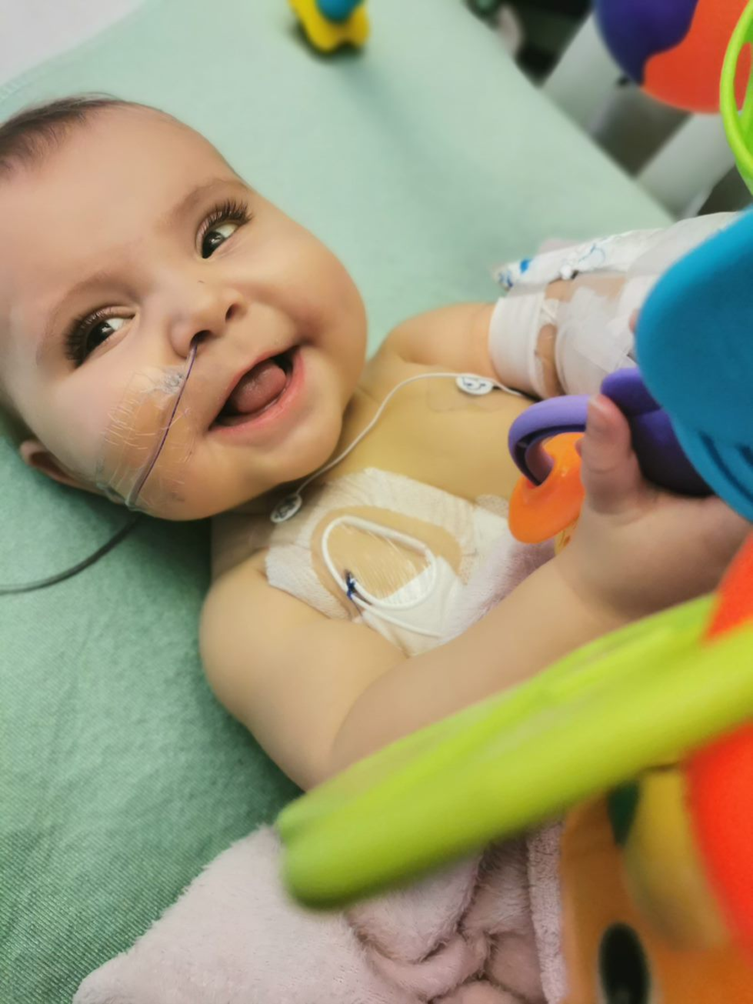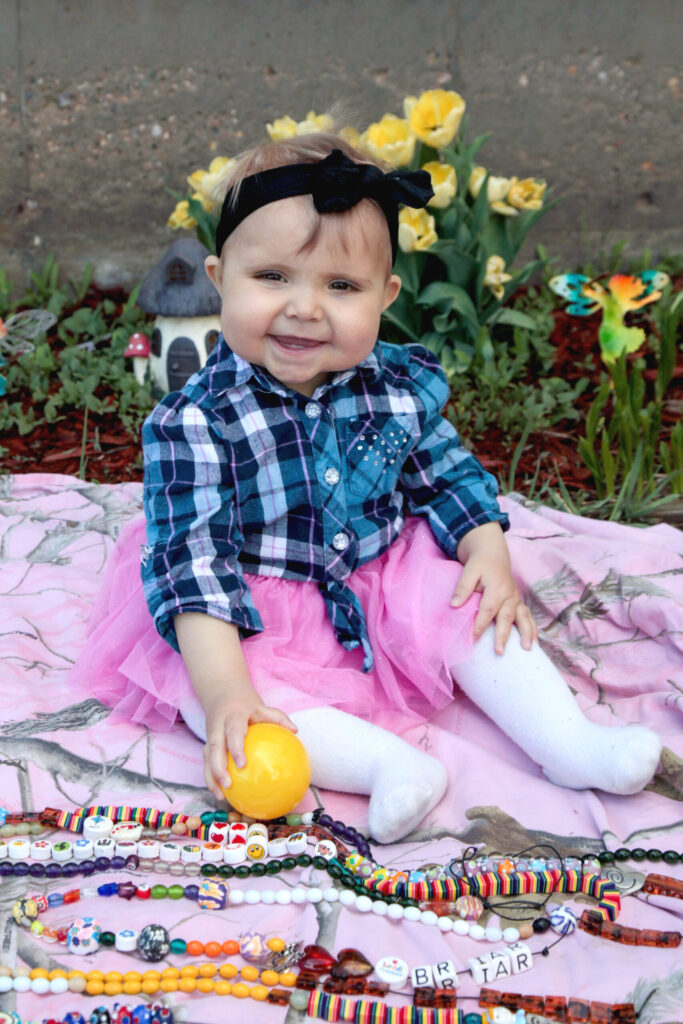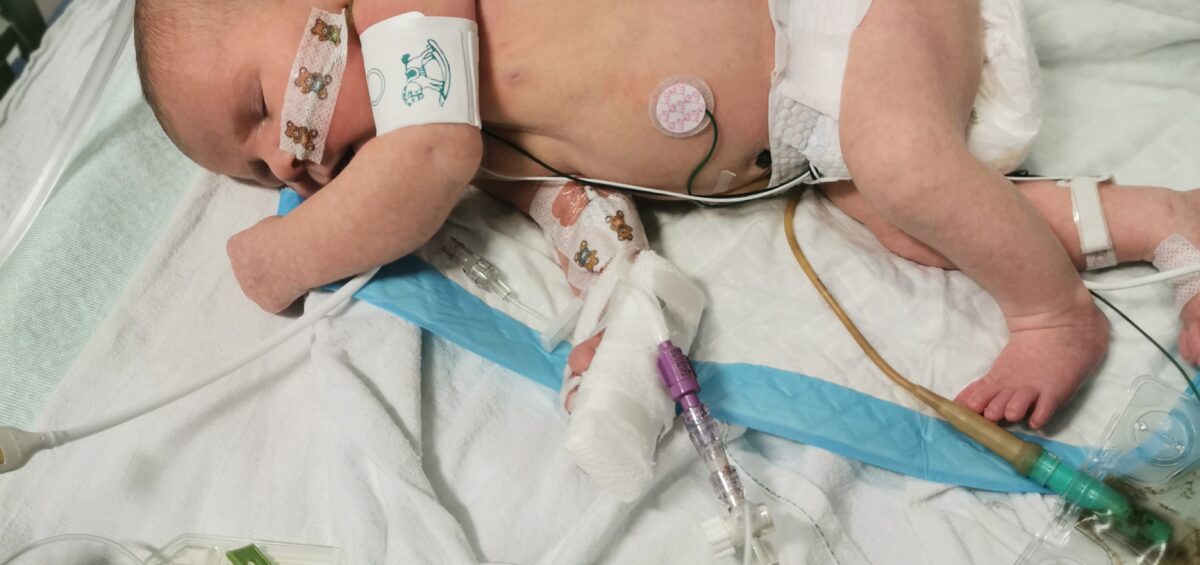Thirty-six hours after Briar was born her parents, Morgan and Ryan, took her home to their small town in Saskatchewan. She had still not had any bowel movement and both parents thought that was odd as Briar was their second child and this had not happened when Addilyn was born. Upon returning home Briar began to throw up. Only nine hours after leaving the hospital, the family was back in the emergency clinic. Shortly after arriving, the medical team confirmed the family’s fears. Briar was very sick.
Morgan and Ryan spent the next four months bringing Briar to and from medical appointments, x-rays and tests. This was a challenging time for the family as they worked to balance caring for Briar and Addilyn. Initially, she was misdiagnosed with cystic fibrosis, a disease that causes severe damage to the lungs, digestive system and other organs in the body. Then she was misdiagnosed again with Hirschsprung disease, a birth defect that causes the muscles in an
infant’s bowel to lose their ability to move stool through the intestines. Morgan had been researching constantly and suspected that Briar had Megacystis-Microcolon-Intestinal Hypoperistalsis Syndrome (MMIHS). MMIHS is a rare disease that affects the muscles that line the bladder and intestines and is characterized by the impairment of the muscle contractions that move food through the digestive tract and empty the bladder. Briar’s third formal diagnosis is MMIHS.
At the beginning of 2021, shortly after Briar’s diagnosis, Briar, Morgan and Ryan travelled from their home in Saskatchewan to Edmonton for a transplant assessment. The medical team determined she would need a transplant and she was placed on the waitlist for a multivisceral transplant on January 4th. In Briar’s case, this means she has now been waiting over half a year for a kidney, liver, small bowel, and pancreas transplant. The Foundation assisted the family with the cost of accommodation, gas, parking and food for the transplant assessment trip at the Stollery Children’s Hospital in Edmonton.
Briar’s medical condition and subsequent need for a transplant has been challenging for the family. They have extra fuel costs, daycare costs for their two-year-old Addilyn, and additional medication costs as some of the prescriptions that Briar needs are not covered by insurance. Ryan has missed a lot of work since Briar was born and Morgan is unable to return to work as she balances being a full-time mother to two young children and Briar’s nurse. Due to COVID-19, the family has been separated from most of their extended family who lives three or more hours away, which Morgan acknowledges has been challenging for everyone.
Every phone call that is received by a private number, an unknown number, or any hospital number immediately makes me start running through questions: Is this the call that is going to change our lives even more than they have already changed? Is everyone ready to drop everything immediately to help us get in gear to go? Where are we going to stay exactly and how much will the expense be? How will the trip work logistically with COVID-19? How long will we have to leave our home empty? Both our children are with each other every day, how are they going to handle being separated for possibly a long time due to COVID-19? How will we be able to handle the transition to an entirely new province where we have no supports?
Now that the family is at home waiting for a transplant, Morgan explains that the family is constantly wondering how they will be able to afford to pay their mortgage and bills that need to be paid regardless of their life circumstances. On top of financial stress, she says that “every phone call that is received by a private number, an unknown number, or any hospital number immediately makes me start running through questions: Is this the call that is going to change our lives even more than they have already changed? Is everyone ready to drop everything immediately to help us get in gear to go? Where are we going to stay exactly and how much will the expense be? How will the trip work logistically with COVID-19? How long will we have to leave our home empty? Both our children are with each other every day, how are they going to handle being separated for possibly a long time due to COVID-19? How will we be able to handle the transition to an entirely new province where we have no supports?”
Currently, Briar is hooked up to a total parenteral nutrition machine for 18 hours a day so she can get the nutrients that she needs. She has adapted to the lines that connect her to the machine and sometimes her parents have to chase her to ensure that she doesn’t pull the lines too hard. Most of her appointments are online or by phone, but the family still makes trips to the hospital as well. Her liver is slowly getting worse amongst other issues due to her lack of mobility. For the rest of her life, she will also have an ileostomy, a surgery that creates a pathway from the lowest part of the small intestine to the abdomen that helps solid waste and gas exit the body without passing through the colon or rectum.”
This summer, Morgan and Ryan are looking forward to being able to see friends and family outside. They think that Briar will start walking soon, as she currently crawls after everyone in the family and are excited to see her and her sister running around and playing together. Morgan shares that Briar and her sister, Addilyn, have a very special bond and are hilarious together. For now, the family is happy to be at home with each other while they wait for the call to transplant.





